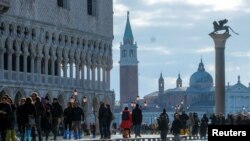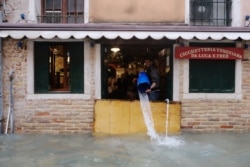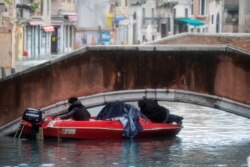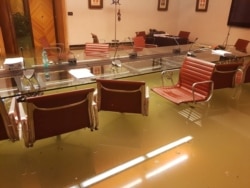Venetians were woken up at dawn Friday to the wailing of flood sirens and the lapping of water as the already-deluged Italian city was struck by a new tidal surge, further damaging ancient monuments, palaces and churches and striking fear into residents.
Although the new high tide, swollen by days of torrential rains, didn't reach the height of Tuesday's "acqua alta," or high waters, authorities say that more than 80 percent of the stricken city, a UNESCO world heritage site, is covered in water with shops marooned, homes flooded, and street kiosks and newsstands washed away.
The Italian prime minister, Giuseppe Conte, declared a state of emergency Thursday after sewage-tainted rivers coursed down Venice's narrow streets and flooded the city's iconic St. Mark's Square. He called the flooding "a blow to the heart of our country" before taking a tour by powerboat to visit businesses and locals impacted by the tide.
On Tuesday, the water level surged 1.87 meters above normal, the highest since it rose 1.94 meters during a 1966 flood that drove many Venetians to leave the city, never to return.
Federal and local authorities have blamed climate change for the flooding of one of the world's most stunning artistic landmarks. Environment Minister Sergio Costa says much of the problem lies with the "tropicalization" of weather in the Mediterranean region. The tides have been worsened by sirocco winds blowing in from Africa, forcing water up the Adriatic Sea into Venice's lagoon.
But many locals say governments have not done enough to protect the city and have abjectly managed a new planned-but-as-yet-incomplete system of sea defenses.
Irreparable damage
The city, which consists of more than 100 islands inside the lagoon, suffers yearly flooding but the current deluge is extreme and will leave a permanent mark on the city, according to Venice's mayor, Luigi Brugnaro. The crypt of the 11th century St. Mark's Basilica was flooded for the first time since 1966.
"It was as if a huge wave entered our basilica," Carlo Alberto Tesserin, head of the board responsible for the building, said earlier in the week.
The Patriarch of Venice, Francesco Moraglia, said water damage to the basilica's marble columns and gold leaf mosaics was irreparable.
Many tourists this week left the city struggling to maneuver their luggage along raised trestle walkways. Others stayed, determinedly snapping selfies.
Many residents said the damage would be repaired and that they would never migrate from their beloved Venice, demonstrating their defiance by stopping for morning coffee and standing in flooded bars.
Government blamed
But mixed with defiance is anger at the failure of successive Italian governments to complete an innovative flood defense system called the MOSE project, an integrated system of 78 gates installed at inlets able to isolate the Venetian Lagoon from the Adriatic Sea during high tides and designed to protect the city from swells of up to 3 meters.
Construction work began in 2003 but its planned opening in 2016 didn't happen after several delays, mainly because of cost overruns and corruption scandals.
In 2014, the project was placed under a special administration in a bid to stop the awarding of corrupt contracts. The project is meant to be completed by 2022 at an estimated cost of more $6.6 billion. During a recent test of some of the gates already installed, however, inspectors discovered serious rust.
"We don't know when we will reopen. Thank you MOSE!" read a sign tacked on the door of a small bakery in the San Polo neighborhood of the city. Shop owner Fabio Bagarotto told reporters, "All the tax money that has been spent on MOSE and it's not even finished. Politicians don't care about ordinary people."
"They've done nothing, neglected it. It doesn't work and they have stolen 6 billion euros. The politicians should all be put in jail," 62-year-old Dino Perzolla told the French news agency.
The mayor and the country's transport minister, Paola De Micheli, have pledged the construction work will get done, but Venetians are skeptical it will be ready by the 2022 deadline.
Giuseppe Conte told the Corriere della Sera newspaper Friday that he plans to summon a high-level ministerial meeting for Nov. 26 to discuss the best way to safeguard Venice and how to speed up the completion of the MOSE project. He said the committee also needs to examine claims that work done so far has exacerbated the flooding and whether the excavation of canals to accommodate huge cruise ships has compounded the problem.
Official government reports have warned the city will be under water within a century if climate change isn't slowed and a defense system put in place.










